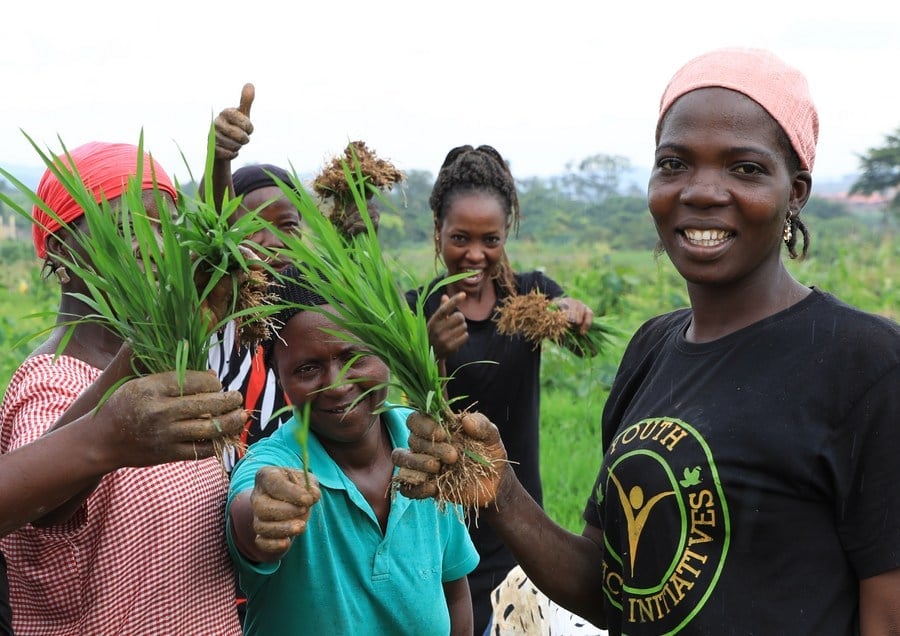December 21, 2025 | 08:47 GMT +7
December 21, 2025 | 08:47 GMT +7
Hotline: 0913.378.918
December 21, 2025 | 08:47 GMT +7
Hotline: 0913.378.918

Local employees display rice seedlings at the Nigerian Agricultural Technology Demonstration Center in Abuja, Nigeria, Sept 19, 2023. Photo: Xinhua.
Adopted in January 2025 during the African Union's Extraordinary Summit in Kampala, Uganda, the declaration outlines a 10-year roadmap (2026–2035) to increase agrifood output by 45 percent, reduce post-harvest losses by 50 percent, triple intra-African trade in agrifood products, and mobilize $100 billion in investments.
"This is a game changer," said John Steenhuisen, South Africa's Minister of Agriculture. "It is encouraging to see agriculture topping discussions across the continent, showing a real commitment to improve food security and drive development. The declaration comes at a pivotal moment in geopolitics and offers Africa a fresh opportunity to become self-reliant."
The declaration builds on two decades of reforms under the Comprehensive Africa Agriculture Development Programme (CAADP), launched in 2003 to promote agriculture-led economic growth. It was reinforced by the Malabo Declaration in 2014 (which was a commitment by Heads of State and Government to transform Africa's agriculture for shared prosperity and improved livelihoods), which set specific goals to be achieved by 2025. Despite progress, the 2023 CAADP Biennial Review revealed that no country was fully on track, due to low food security and underdeveloped infrastructure, which hampered progress in meeting the goals, prompting calls for a more robust strategy.
Therefore, to address these challenges, the Kampala Declaration takes on a broader scope, tackling gaps in Africa's agrifood systems, including inefficient supply chains, inadequate infrastructure, and low levels of investment.
The Food and Agriculture Organization (FAO) estimates that over 250 million Africans remain undernourished, while more than 40 percent of agricultural output is lost post-harvest. The Kampala Declaration directly targets these issues with clear goals and inclusive strategies, especially for smallholders, women, and youth.
"The launch of this declaration shows hope that has been planted in Africa's agriculture landscape, symbolizing the transformation of our agriculture sector and the prosperity of African people," says Moses Vilakati, the Africa Union Commissioner for Agriculture, Rural Development, Blue Economy and Sustainable Environment (ARBE).
Chinadaily
/2025/12/17/0042-2-075234_14.jpg)
(VAN) In Vinh Long, high-quality, low-emission rice models are being scaled up from cooperatives, helping reduce production costs, increase farmers' incomes, and protect the environment.

Professor Nguyen Duc Ngu, the third generation of leaders since the establishment of Vietnam’s Hydrometeorology sector has witnessed and lived through the long arc of its development.

(VAN) Climate change, saline intrusion, and unsustainable farming practices are depleting agricultural land in the Mekong Delta. Restoring soil health is a key solution for the future of agriculture.

(VAN) Agroforestry coffee not only enhances coffee quality but also helps farmers in Quang Tri enter carbon credit market with high expectations.

(VAN) Towards Net Zero 2050, fertilizer manufacturers are proactively developing bio-based products, reducing emissions, and demonstrating responsibility to the environment.

(VAN) The smart rice cultivation model, which reduces methane emissions and aims at developing agricultural carbon credits, has been deployed in Thai Nguyen province and delivered positive results.

(VAN) The purpose of this visit is to unify the proposal for a technical assistance project supporting sustainable agricultural and forestry development in Angola.